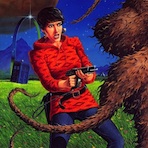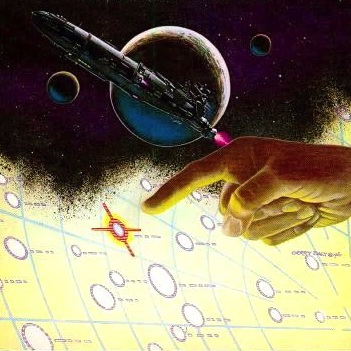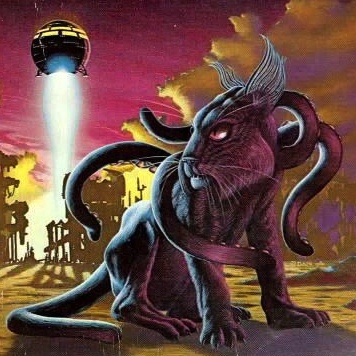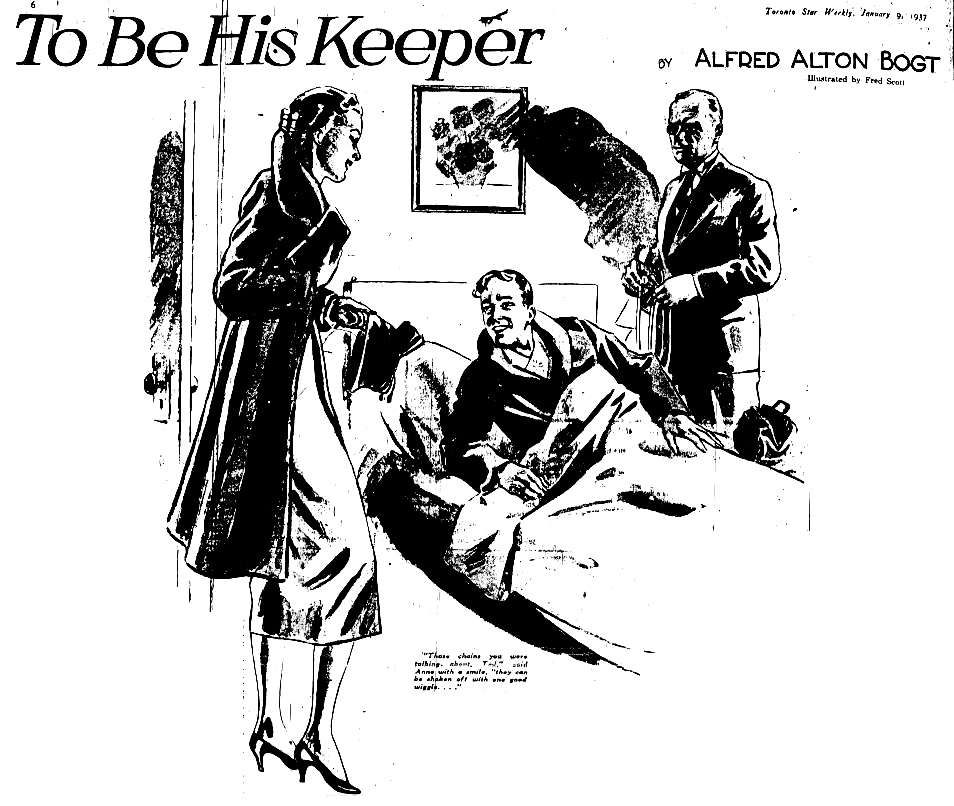Old Gus was very talkative as he urged the horses over the hard snow.
"Yes sirree, anybody who ain't seen Ted Walters since before his wife left him won't hardly recognize him, he's so changed. Saw him a couple weeks ago, an' I sure wuz shocked. You bein' his sister, ma'am, I just thought I'd kinda warn ya; so you wouldn't be too surprised." He mused, "Funny, I never knew he had a sister till ya hired me at the station."
The girl said: "No, I suppose he never talked much about his family, even before his — his wife left him."
Her face, as she spoke, was hidden under the thick veil that she had not yet lifted. Old Gus squinted sideways at her, wishing that she would remove the impediment.
"Wal, now," he answered her, "I wouldn't say that. Ted Walters wuz a darn nice feller, in spite of him being a writer an' all that — as sociable to talk to as you could meet anywhere. 'Course, he ain't done no writin' this last year an' a half. He hardly even talks to anybody nowadays. Just hides himself away on that farm he inherited from his grandma, an' he sure is lettin' that place run to seed."
"Do you think —" the girl's voice was muffled. "Do you think his wife was wrong running away from him?"
Old Gus pondered.
"I wouldn't have brought up the subject myself, but seein' as you ask me, I'd say she was an' she wazn't."
"What do you mean? — she was and she wasn't!" The girl spoke impatiently.
Old Gus, meek soul that he was, looked apologetic. "I mean it was natural for her to get mad when he loses his head 'bout that actress that comes down here to visit 'em, but to my way o' thinkin' she shoulda given him another chance."
Funny, she thought how everybody was always telling her that. "Give him another chance!" For Goodness sake, Anne, we'd like to see Ted again. Take him back, won't you?" "I'd think he's crazy to take love so hard. But the only people I can stand these days are the crazy ones. So give him another chance, Anne."
They didn't know, they couldn't know how the very mention of what Ted had done sent an obscuring mist of rage over her brain. She couldn't understand it herself. Her reason had told her time and time again, "I can't hate him as much as that. I'm not that inhuman." But she did. She was.
"Quit Acting"
They had stopped before a gate, which was leaning forward alarmingly on one rusty hinge. She thrust a ten dollar bill into the old man's expectant fingers.
"Come back in an hour. I'm returning to New York by the afternoon train."
After climbing through the gate, she turned to examine it, and smiled contemptuously when she found what she had expected. She glanced about the rusty machinery, scattered haphazardly in the snowdrifts. Dramatic. Everything arranged for dramatic effect.
Her knock remained unanswered, she tried the knob. The door opened instantly. A wave of heat met her. She smiled humorlessly as she remembered Ted's love of warmth and comfort. A villager had always tended the furnace.
"Ted," she called. Silence answered.
"In bed," she thought then. "Always was lazy."
She threaded her way through the stifling hot dining room, with its gleaming oak furniture. A second brought her to the bedroom.
Her first reaction at what she saw was disgust. An unshaven young man sprawled on the bed. His face looked — bleary. She sniffed contemptuously and walked over. He seemed to be asleep. Shamming, she thought. She shook him.
"Wake up!" she snapped.
He stirred and moaned a little but did not open his eyes. She shook him again, rudely. He groaned, and twisted about for a moment. His face was very pale.
The man's eyes opened, stared at the ceiling. His lips moved.
"Where am I? I — oh, gosh, I feel rotten."
Anne sank into a chair. "Quit acting, Ted," she said wearily, "I'm wise."
At the sound of her voice, a pair of dull, red-rimmed eyes swung upon her. The eyes — and face — visibly brightened as they took her in.
"Anne," he mumbled with pathetic eagerness that did not fool her for an instant, "Anne, you've come back to me. Oh, my darling, I knew you would. I've been waiting for you for so long —" His voice faded, "— so long —"
"Oh, lord," she sighed, "you're a terrible actor, Ted. You used to be pretty good, but you've lost your dramatic instinct. I might as well tell you now that I saw how you had arranged the gate to hang in that forlorn fashion — and the machinery spread all over the yard to look as if things were in bad shape. All I can say is that it's an insult to my intelligence. You don't seem to realize that those little boy tricks amused me when I loved you, but now they just annoy me."
He was wider awake now, but his voice still retained that irritating huskiness.
"Oh, that." He waved an arm vaguely. "Don't be angry about that. I did all that — ages ago — before I realized you really meant to stay away. I did it because I wanted to make you laugh — thought I could do it with those tricks." His voice began to fade. "Sorry, you're seeing me like this," he mumbled, "but I'm sick...sick...pneumonia..." His eyes closed and he lay very still.
Wild Reports
Anne laughed harshly. "So that's the game, eh — sick! Now, what am I supposed to do? Nurse you back to health again? And fall in love while I'm doing it? Sick! — That's a good one. You've never been sick in your life."
His eyes opened during her outburst, and he stared at her steadily, intelligently.
"I see it's no use trying to fool you," he said slowly.
"Then quit talking in that hoarse whisper."
"Can't help that. Got a little cold. Nothing to speak of."
"You saw me through the window?"
He nodded, slowly. "Yes — through the window." He added, "I was just getting up."
There was silence.
"You know," he said finally, "I've been trying to figure out why you came."
Anne shrugged. "Oh, I received such wild reports of how you were taking my leaving you, and your friends were beginning to blame me for letting such a talented young writer ruin his life — you know how unjust people are —"
He nodded. "That bunch, anyway. They live on their emotions."
"Of course," she went on, "I knew what was the matter. It was your dramatic instinct. Nobody's told you, I guess, that artists don't die for love anymore. Anyway, I came to ask you to pull yourself together. I don't want to have you on my conscience."
He answered, after a moment, in a subdued whisper. "I'll come to New York next week."
She stood up. "That's fine. Well, good-by. I'll be seeing you." She walked to the door. "I'm not going to wait for Old Gus. It's only two miles to the station. The walk will do me good."
"There's no chance of winning you back, is there?" He asked the question in a hopeless tone.
"None! Still, I'm glad I came. For a year and a half I've hated you. Now that I've seen you, I don't any more. I've suddenly realized that I'm quite indifferent to you. You're just another man. Good-by."
He did not answer, only pulled the quilts more tightly around him. The picture remained with her, annoyingly, as she tramped along the road. He oughtn't to be alone there, she thought. It was idiotic.
A sleigh came towards her from the village. She recognized Dr. Carter, whom she had known slightly in the old days. Veil down, she walked stolidly past his curious gaze.
After a while quite instinctively, she turned her head — and saw him driving through the gate by which she had just come. She stopped short. A darting fire confused her thoughts. "I'm sick," he had said. She quivered. It would be just like him to...
She trudged on. He was quite capable of making such a gesture...He'd play with death itself...he probably refused a nurse...The way he had agreed to everything she'd said...that damnable dramatic streak in his make-up...He was crazy of course, and needed a keeper, and she was a fool and...
Tears scalded her cheeks. She whirled abruptly, and ran back along the road...The door opened softly to her touch. Her throat felt strangely thick, her tongue heavy and unwieldy. This was harder than — anything!
Voices came to her as she tiptoed along the hall into the dining room. Dr. Carter was speaking in a hearty tone:
"With a little nursing, you'll pull through in no time."
Anne was amazed to hear a laugh from Ted, a husky laugh but quite cheerful. "Oh I'll have plenty of nursing," he said. "My wife has returned from New York, and I'm back in chains again."
Anne stopped short in the hallway that led from the dining room to the bedroom.
Why had he said that? He was making it harder. He couldn't know that she was returning. He could only guess that she hadn't come all this way in the first place without having relented. But, being Ted, he was probably as convinced as if she had begged him to take her back.
"It's too bad," said the doctor, "that she didn't recognize me on the road. I could have had all the stuff she needed sent up from town."
"Chains," came Ted's voice speculatively, affectionately, "are good for a man's soul. They keep him from going crazy."
"I should have stopped anyway, and spoken to her." The doctor carried on his own train of thought. "Oh, she'll be back," the sick man reassured him.
And the worst of it, Anne reflected, was that it was true. She was back. Annoying to have him so right. It's wasn't good for a man to be right. But there he lay, sick, unrepentant, without a trace of the humility of a few minutes before. It was the old Ted, exasperatingly smug in his knowledge of her, incurably romantic about himself and probably already planning to commemorate the occasion by writing one of his happy-ending stories, in which he would be the forgiving and ill-used hero.
He would always be like that. And she would always love him because he was. Darn him!
Suddenly, it was easy to step forward, easy to smile and to move casually, and to say:
"Those chains you were talking about, Ted, can be shaken off by one good wriggle."
He stared at her from wide eyes that grew brighter and brighter and brighter.
"Wriggling is a lost art with me," he said finally, drawing a deep breath, "but how I do need those chains."









Van Vogt wrote quite a lot before he began writing science fiction in 1939, mostly "confession" stories and radio plays. He also contributed a fair number of miscellaneous stories to various newspapers and magazines throughout the '30s. In his 1975 autobiography Reflections of A.E. van Vogt he mentions a story published in the Toronto Weekly Star as an example of the publishers getting his name wrong in the byline — in this instance he was credited as "A. Ban Bogt." He did not give the story's title or say when it was printed.
In 2002, Canadian fan George Gilbert searched through the Toronto Star archives and found the story in section 6 of the January 9th, 1937 issue. Running at 1,911 words and entitled "To Be His Keeper," it was credited to "Alfred Alton Bogt." It's the story of a manipulative writer's reuniting with his estranged wife. Although it is a prime example of the slick, melodramatic "everyday life" genre, it nonetheless shows some typically vanvogtian elements. His early work adhered rigidly to the writing methods suggested by John Gallishaw, and this story is a fine example of that. It also shows one of van Vogt's recurring concerns, in that it shows the negative effects of people who are controlled by their emotions.
Keeping in mind the fact that van Vogt would rather have his pre-SF work forgotten, it is not surprising that he had misremembered the details at the time of writing his autobiography some 35 years later — recalling "A. Ban Bogt" rather than "Alfred Alton Bogt." Indeed, so great was his dislike for his early output that it is doubtful whether he even retained copies of these old stories. As a result, all of his pre-1939 work remains very obscure — prior to Gilbert's discovery, only the titles to two other stories were known: "No One to Blame But Herself" (also known as "I Lived in the Streets") and "The Miracle in My Life".
The following story is Copyright ©1937 by A.E. van Vogt. It is reproduced here by kind permission of Lydia van Vogt and of Dan Hooker at the Ashley Grayson Literary Agency, representing the author's estate. Isaac Walwyn has exclusive permission to reproduce this story, so it is requested that it not be distributed or posted elsewhere.
The following transcription is by Gilbert and includes all the errors found in the original. It was accompanied by a single illustration by Fred Scott.